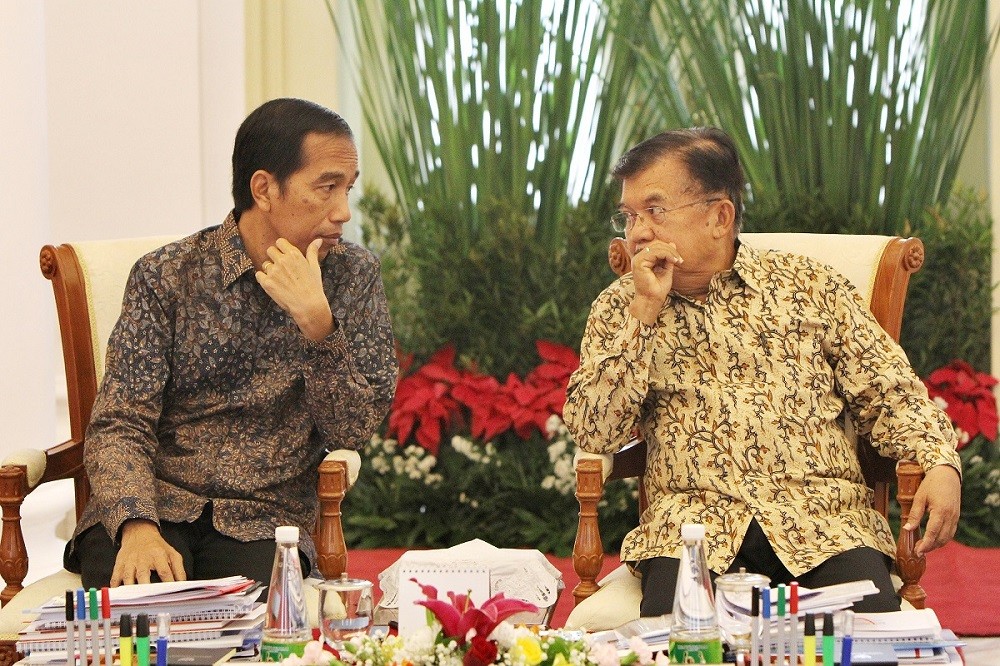Popular Reads
Top Results
Can't find what you're looking for?
View all search resultsPopular Reads
Top Results
Can't find what you're looking for?
View all search resultsJokowi pledges to close inequality gap in 2017
Change text size
Gift Premium Articles
to Anyone
 Serious business: President Joko “Jokowi” Widodo (left) talks to Vice President Jusuf Kalla during a plenary Cabinet meeting to discuss government programs in 2017 at Bogor Palace in West Java on Wednesday. The goverment plans to focus on reducing the prosperity gap in society as well as the economic gap between regions. (Antara/Yudhi Mahatma)
Serious business: President Joko “Jokowi” Widodo (left) talks to Vice President Jusuf Kalla during a plenary Cabinet meeting to discuss government programs in 2017 at Bogor Palace in West Java on Wednesday. The goverment plans to focus on reducing the prosperity gap in society as well as the economic gap between regions. (Antara/Yudhi Mahatma)
T
his year, President Joko “Jokowi” Widodo’s administration will focus on reducing social and economic disparities. Jokowi called on his ministers on Wednesday to step up the implementation of the government’s poverty eradication programs.
Although Indonesia slightly improved its Gini ratio, a term that measures national inequality, Jokowi’s concerns about inequality in the country are not unfounded.
Credit Suisse’s Global Wealth Report 2016 found that Indonesia was the fourth most unequal country in the world, behind Russia, India and Thailand. The report shows that up to 49.3 percent of Indonesia’s wealth is controlled by the richest 1 percent of the population.
The Gini ratio was reduced to 0.387 in March 2016 from 0.402 in September 2015, according to the Central Statistics Agency (BPS).
“We have to work as hard as we can. Disparities should be cut down further, both between the wealthy and the poor and also between regions,” said Jokowi.
Jokowi gave the instruction while meeting all his ministers and the heads of related institutions for the first plenary Cabinet meeting of 2017 at Bogor Palace in West Java.
In the meeting, Jokowi also stressed the need to further cut the poverty rate from 10.86 percent in July 2016 to 10.5 percent by the end of this year.
As part of the effort to cut down the poverty rate, the President has ordered both the agrarian and spatial planning minister and the environment and forestry minister to speed up the process of redistributing land to people through the formalization of land ownership.
This is needed to help people, particularly farmers, use their land to improve their welfare, Jokowi said.
Coordinating Economic Minister Darmin Nasution said Jokowi also asked his ministers to study the possible correlation between economic growth and factors such as the unemployment rate, economic disparity and people’s incomes.
“It is true that during the 20152016 period there was some growth, although not a significant amount of it. Meanwhile, unemployment and poverty rates decreased and income distribution improved,” Darmin said during a press conference after the Cabinet meeting.
“The President asked us to closely study what the effects of wide infrastructure development are on poverty.”
Also speaking during the press briefing, Finance Minister Sri Mulyani Indrawati emphasized the importance of increasing the ratio of tax to gross development product (GDP) from its present level of 11 percent. She said that increasing it to just 15.3 percent would be equal to Rp 14 quadrillion in new tax revenue. The government is currently running a tax amnesty program that it hopes will increase the nation’s tax base.
“The numbers show that if we make taxation more effective, then we can take money from those in a better economic situation and distribute it to state spending that favors those below the 40 percent. Education, health, infrastructure and even cash transfers can be distributed to the poor,” she said.
In the meeting, Jokowi reminded his ministers not to ignore cultural development and the nation’s character, arguing that the values of Pancasila were key to countering growing radicalism in the country. The President expects to set up a kind of working unit tasked with instilling the values of Pancasila in daily life.
The working unit, which will be under Jokowi’s direct supervision, is expected to be up and running this month.
The issue on Papua, the country’s easternmost region and one of its poorest areas, was also discussed that day.
Coordinating Political, Legal and Security Affairs Minister Wiranto insisted that the government was pushing for inclusive development in the region where violent incidents and alleged human rights abuses often occur, placing the region in the international spotlight.
In the meeting, Jokowi also gave his consent for the establishment of another new body to resolve disagreements and conflicts through peaceful dialogue.









